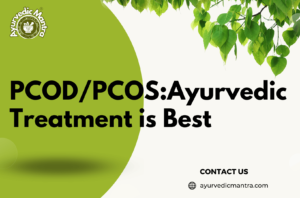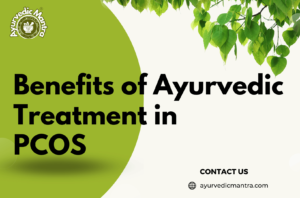
PCOD/PCOS: Ayurvedic Treatment is Best
Introduction Polycystic Ovary Disorder (PCOD) or Polycystic Ovary Syndrome (PCOS) is a common endocrine disorder affecting millions of women worldwide. It leads to hormonal imbalances,


Polycystic Ovary Syndrome, commonly known as PCOS, is a hormonal disorder that affects many women worldwide. Its symptoms can vary widely, including irregular menstrual cycles, excessive hair growth, acne, and even difficulties with fertility. While PCOS is a complex condition influenced by various factors, including genetics, lifestyle choices, and hormonal imbalances, adopting a well-balanced and nutrient-rich diet can significantly manage its symptoms. In this article, we will explore essential nutrition tips to help individuals with PCOS lead healthier and more balanced lives.
Incorporating complex carbohydrates into your diet can positively impact your PCOS symptoms. Choose brown rice, quinoa, and whole wheat bread over refined carbohydrates. These foods have a lower glycemic index, which means they have a slower impact on blood sugar levels, helping to stabilize insulin levels – a crucial factor in PCOS management.
Including lean protein sources in your meals can aid in maintaining steady blood sugar levels and support muscle health. Opt for skinless poultry, fish, legumes, and tofu options. Protein-rich foods can also help you feel fuller for longer, reducing the temptation to reach for unhealthy snacks.
Healthy fats, such as those found in avocados, nuts, seeds, and fatty fish like salmon, contain essential fatty acids that support hormonal balance and overall well-being. These fats are crucial in reducing inflammation, which can benefit individuals with PCOS.
A fiber-rich diet can aid digestion, help regulate blood sugar levels, and promote a feeling of fullness. Vegetables, fruits, whole grains, and legumes are excellent sources of dietary fiber. Adding more fiber to your meals can help weight management and alleviate some PCOS symptoms.
Proper hydration is essential for everyone but important for individuals with PCOS. Drinking adequate water throughout the day supports metabolism, hormone regulation, and overall bodily functions. Aim for at least 8 glasses of water daily.
Inflammation can exacerbate PCOS symptoms. Including anti-inflammatory foods in your diet, such as berries, leafy greens, turmeric, and green tea, can help reduce inflammation and potentially alleviate discomfort.
Maintaining portion control is crucial, especially if weight management is a concern. Be mindful of portion sizes to avoid overeating and ensure a balanced nutrient intake.
Excessive sugar consumption can lead to insulin resistance, a common concern for individuals with PCOS. Minimize your intake of sugary snacks, beverages, and processed foods to help stabilize blood sugar levels.
Specific vitamins and minerals play a significant role in PCOS management. Vitamin D, in particular, has been associated with improved insulin sensitivity. Additionally, magnesium and zinc are essential for hormonal balance. Consider consulting a healthcare provider about potential supplements.
Practicing mindful eating involves paying close attention to your body’s hunger and fullness cues. Eating slowly and savoring your meals can help prevent overeating and promote better digestion.
While there is no one-size-fits-all approach to managing PCOS through nutrition, adopting a balanced diet rich in complex carbohydrates, lean protein, healthy fats, fiber, and anti-inflammatory foods can positively impact your overall well-being. Combined with a healthy lifestyle and personalized medical guidance, these nutrition tips can contribute to better symptom management and a higher quality of life for those with PCOS. Remember, small dietary changes can lead to significant improvements over time, so start incorporating these tips into your daily routine today.
A1: Polycystic Ovary Syndrome (PCOS) is a hormonal disorder that affects the ovaries’ function and is characterized by multiple small cysts on the ovaries. It can lead to various symptoms, including irregular menstrual cycles, hormonal imbalances, acne, excessive hair growth, and difficulties with fertility. PCOS can also increase the risk of insulin resistance, diabetes, and cardiovascular diseases.
A2: Nutrition is crucial in managing PCOS symptoms by influencing hormone regulation, insulin sensitivity, and inflammation. A balanced diet rich in complex carbohydrates, lean proteins, healthy fats, fiber, and anti-inflammatory foods can help stabilize blood sugar levels, reduce inflammation, and support overall hormonal balance.
A3: Individuals with PCOS are encouraged to include whole grains (e.g., quinoa, brown rice), lean proteins (e.g., fish, tofu), healthy fats (e.g., avocados, nuts), fiber-rich foods (e.g., fruits, vegetables), and anti-inflammatory foods (e.g., berries, turmeric) in their diet. These foods can help manage PCOS symptoms and promote better overall health.
A4: Certain nutrients and supplements may support PCOS management. For example, vitamin D has been associated with improved insulin sensitivity, while magnesium and zinc are essential for hormonal balance. However, you must consult a healthcare provider before taking any supplements to ensure they are appropriate for your needs.
A5: Staying hydrated is vital for individuals with PCOS. Proper hydration supports metabolic functions, hormone regulation, and overall well-being. Drinking adequate water throughout the day can help maintain healthy bodily functions and potentially alleviate some PCOS symptoms.
A6: Yes, weight management is crucial for individuals with PCOS. Excess weight can worsen insulin resistance and hormonal imbalances, leading to more severe symptoms. Adopting a balanced diet and regular physical activity can help weight management and alleviate PCOS-related concerns.
A7: While nutrition is an essential aspect of PCOS management, it is just one component of a comprehensive approach. Lifestyle factors like exercise, stress management, and medical interventions may also be necessary to manage PCOS symptoms and improve overall health effectively.
A8: Individuals with PCOS should limit their consumption of refined carbohydrates, sugary snacks, and processed foods. These foods can lead to insulin spikes and worsen insulin resistance. Moderating caffeine and alcohol intake is also advisable.
A9: Mindful eating involves being present and attentive while consuming meals, which can help individuals with PCOS recognize hunger and fullness cues. This practice can prevent overeating, promote better digestion, and promote a healthier relationship with food.
A10: No, nutrition cannot replace medical treatment for PCOS. While a balanced diet can help manage symptoms and improve overall health, working with healthcare professionals to develop a comprehensive treatment plan that may include medications, hormonal therapies, and lifestyle modifications is essential.

Introduction Polycystic Ovary Disorder (PCOD) or Polycystic Ovary Syndrome (PCOS) is a common endocrine disorder affecting millions of women worldwide. It leads to hormonal imbalances,

Introduction Losing weight is a journey that requires dedication, consistency, and self-care. While there are numerous weight loss techniques out there, not all of them

Polycystic Ovary Syndrome (PCOS) is a hormonal disorder that affects millions of women worldwide. It can lead to various health complications, such as irregular periods,

In recent years, Ayurveda, an ancient system of natural healing originating from India, has gained significant popularity as an alternative approach to treating various health

आजकल वजन बढ़ने और चर्बी की वृद्धि होने की समस्या एक आम समस्या बन गई है। बढ़ते वजन और अतिरिक्त चर्बी के कारण न केवल

प्रस्तावना: आजकल वजन बढ़ने और ओबेसिटी की समस्या एक आम समस्या बन गई है। बढ़ते वजन के कारण न केवल शारीरिक समस्याएं होती हैं, बल्कि
